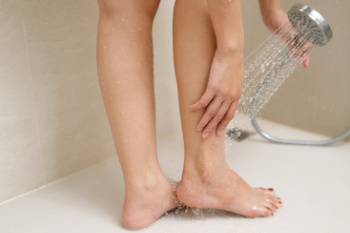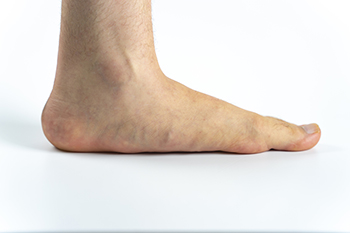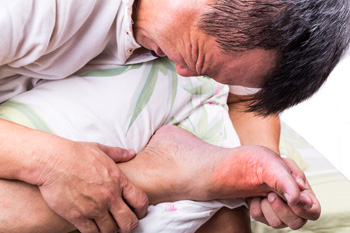Items filtered by date: January 2024
Strategies for Sustaining Healthy Feet

Caring for your feet is a cornerstone of overall well-being, directly influencing our ability to move and navigate the world with ease. Prioritize cleanliness by washing and thoroughly drying feet daily, safeguarding against infections and discomfort. Choose footwear wisely, opting for pairs that provide proper support, fit well, and allow ample room for toes to move freely. Regularly trim toenails straight across to prevent ingrown toenails and maintain proper foot hygiene. Additionally, embrace moisture management by applying a mild moisturizer to prevent dryness and cracking. Stretching exercises not only promote flexibility but also enhance circulation, supporting optimal foot health. Mindful inspection of feet for any unusual changes, such as swelling, redness, or pain, allows for prompt intervention if issues arise. Finally, prioritize regular physical activity to promote overall circulation and foot health. If you are seeking additional everyday foot care tips, it is suggested that you consult a podiatrist.
Everyday foot care is very important to prevent infection and other foot ailments. If you need your feet checked, contact one of our podiatrists from Waterbury Podiatry Consultants. Our doctors can provide the care you need to keep you pain-free and on your feet.
Everyday Foot Care
Often, people take care of their bodies, face and hair more so than they do for their feet. But the feet are a very important aspect of our bodies, and one that we should pay more attention to. Without our feet, we would not be able to perform most daily tasks.
It is best to check your feet regularly to make sure there are no new bruises or cuts that you may not have noticed before. For dry feet, moisturizer can easily be a remedy and can be applied as often as necessary to the affected areas. Wearing shoes that fit well can also help you maintain good foot health, as well as making it easier to walk and do daily activities without the stress or pain of ill-fitting shoes, high heels, or even flip flops. Wearing clean socks with closed shoes is important to ensure that sweat and bacteria do not accumulate within the shoe. Clean socks help to prevent Athlete’s foot, fungi problems, bad odors, and can absorb sweat.
If you have any questions please feel free to contact our offices located in Waterbury and Southington, CT . We offer the newest diagnostic and treatment technologies for all your foot and ankle needs.
What Are the Signs of Flat Feet?

Flat feet, a condition where the arches of the feet touch or nearly touch the ground, can be a source of discomfort and may affect daily activities. Understanding the causes and symptoms is vital for those grappling with this common foot ailment. Often, flat feet are hereditary, with genetic factors contributing to the lack of arch development. Tendon or ligament issues, arising from injury or overuse, can also lead to flat feet. Rheumatoid arthritis or conditions impacting the nervous system may alter foot structure, causing the arches to collapse. Symptoms include pain or discomfort along the inner side of the ankle, swelling on the bottom of the feet, and difficulty in standing on tiptoes. Recognizing these signs prompts individuals to seek appropriate interventions, such as wearing supportive footwear or orthotic devices. If you have flat feet, it is suggested that you consult a podiatrist who can guide you toward effective relief options.
Flatfoot is a condition many people suffer from. If you have flat feet, contact one of our podiatrists from Waterbury Podiatry Consultants. Our doctors will treat your foot and ankle needs.
What Are Flat Feet?
Flatfoot is a condition in which the arch of the foot is depressed and the sole of the foot is almost completely in contact with the ground. About 20-30% of the population generally has flat feet because their arches never formed during growth.
Conditions & Problems:
Having flat feet makes it difficult to run or walk because of the stress placed on the ankles.
Alignment – The general alignment of your legs can be disrupted, because the ankles move inward which can cause major discomfort.
Knees – If you have complications with your knees, flat feet can be a contributor to arthritis in that area.
Symptoms
- Pain around the heel or arch area
- Trouble standing on the tip toe
- Swelling around the inside of the ankle
- Flat look to one or both feet
- Having your shoes feel uneven when worn
Treatment
If you are experiencing pain and stress on the foot you may weaken the posterior tibial tendon, which runs around the inside of the ankle.
If you have any questions please feel free to contact our offices located in Waterbury and Southington, CT . We offer the newest diagnostic and treatment technologies for all your foot and ankle needs.
Keep Your Feet Healthy So You Can Stay Active
Treatment Options for Achilles Tendon Pain

Injuries to the Achilles tendon, which connects the calf muscle to the heel bone, commonly lead to Achilles tendonitis or Achilles tendonosis. Both cause pain, stiffness, and discomfort in the lower leg. Differentiating between the two is necessary for effective treatment. Achilles tendonitis results from overuse or sudden activity increase. If left untreated, it may progress to Achilles tendonosis, where the inflamed tendon degenerates, develops microscopic tears, and possibly ruptures. Treatment options vary based on severity, including immobilization with casts, walking boots, or night splints. Recovery typically takes two to three months, but if nonsurgical approaches fail, surgical options like gastrocnemius recession, debridement, and repair, or debridement with tendon transfer may be considered. Surgical intervention is a last resort, emphasizing the importance of early diagnosis and tailored treatment by a podiatrist to prevent further progression of Achilles tendon conditions. For an exam and treatment options, it is suggested that you schedule an appointment with a podiatrist who can discuss the treatment method that is best for you.
Achilles tendon injuries need immediate attention to avoid future complications. If you have any concerns, contact one of our podiatrists of Waterbury Podiatry Consultants. Our doctors can provide the care you need to keep you pain-free and on your feet.
What Is the Achilles Tendon?
The Achilles tendon is a tendon that connects the lower leg muscles and calf to the heel of the foot. It is the strongest tendon in the human body and is essential for making movement possible. Because this tendon is such an integral part of the body, any injuries to it can create immense difficulties and should immediately be presented to a doctor.
What Are the Symptoms of an Achilles Tendon Injury?
There are various types of injuries that can affect the Achilles tendon. The two most common injuries are Achilles tendinitis and ruptures of the tendon.
Achilles Tendinitis Symptoms
- Inflammation
- Dull to severe pain
- Increased blood flow to the tendon
- Thickening of the tendon
Rupture Symptoms
- Extreme pain and swelling in the foot
- Total immobility
Treatment and Prevention
Achilles tendon injuries are diagnosed by a thorough physical evaluation, which can include an MRI. Treatment involves rest, physical therapy, and in some cases, surgery. However, various preventative measures can be taken to avoid these injuries, such as:
- Thorough stretching of the tendon before and after exercise
- Strengthening exercises like calf raises, squats, leg curls, leg extensions, leg raises, lunges, and leg presses
If you have any questions please feel free to contact our offices located in Waterbury and Southington, CT . We offer the newest diagnostic tools and technology to treat your foot and ankle needs.
Causes of Gout

Gout is a painful inflammatory arthritis that often affects the big toe joint. It occurs when urate, a byproduct of purines found in body tissues and certain foods, accumulates and forms needle-shaped crystals in joints. This buildup results in redness, swelling, and extreme pain, disrupting the normal functioning of the affected joint. While high urate levels are a primary factor of causing gout, not everyone with elevated urate experiences gout. Genetics and environmental elements play roles in the urate accumulation process. Several factors increase the likelihood of gout, including familial history, male gender, menopause, advancing age, and alcohol consumption. Dietary choices also influence urate levels. Foods rich in purines, particularly those from animal sources, contribute to urate production. Additionally, habits such as consuming sugar-sweetened beverages amplify the risk. Certain health conditions add to the susceptibility for gout. Obesity, metabolic syndrome, chronic kidney disease, and high blood pressure can elevate urate levels. For advice in managing gout in the big toe or ankle, it is suggested that you schedule an appointment with a podiatrist.
Gout is a foot condition that requires certain treatment and care. If you are seeking treatment, contact one of our podiatrists from Waterbury Podiatry Consultants. Our doctors will treat your foot and ankle needs.
What Is Gout?
Gout is a type of arthritis caused by a buildup of uric acid in the bloodstream. It often develops in the foot, especially the big toe area, although it can manifest in other parts of the body as well. Gout can make walking and standing very painful and is especially common in diabetics and the obese.
People typically get gout because of a poor diet. Genetic predisposition is also a factor. The children of parents who have had gout frequently have a chance of developing it themselves.
Gout can easily be identified by redness and inflammation of the big toe and the surrounding areas of the foot. Other symptoms include extreme fatigue, joint pain, and running high fevers. Sometimes corticosteroid drugs can be prescribed to treat gout, but the best way to combat this disease is to get more exercise and eat a better diet.
If you have any questions please feel free to contact our offices located in Waterbury and Southington, CT . We offer the newest diagnostic and treatment technologies for all your foot and ankle needs.
Exploring the Link Between Foot Pain and Obesity

Obesity, a growing concern in today's society, extends its impact beyond just weight-related health issues, as it may significantly influence the well-being of the feet. The association between foot pain and obesity is a palpable reality, as excess body weight places increased stress on the feet and their intricate structures. Feet, designed to bear the body's load, can become strained and overworked, possibly leading to conditions such as plantar fasciitis and osteoarthritis. The additional pressure on the arches and joints contributes to chronic discomfort, hindering mobility and may diminish the overall quality of life. As body mass increases, so does the likelihood of developing foot pain. Understanding this link underscores the importance of weight management in alleviating and preventing foot-related issues. If you have foot pain, and feel it may be a result of being overweight, it is suggested that you schedule an appointment with a podiatrist who can guide you toward effective relief methods.
Obesity has become very problematic at this point in time and can have extremely negative effects on the feet. If you’re an obese individual and are concerned about your feet, contact one of our podiatrists from Waterbury Podiatry Consultants. Our doctors can provide the care you need to keep you pain-free and on your feet.
Obesity and Your Feet
Since your feet are what support your entire weight when standing, any additional weight can result in pain and swelling. Being overweight is one of the main contributors to foot complications.
Problems & Complications
Extra Weight – Even putting on just a few extra pounds could create serious complications for your feet. As your weight increases, your balance and body will shift, creating new stresses on your feet. This uneven weight distribution can cause pain, even while doing the simplest tasks, such as walking.
Diabetes – People who are overweight are at serious risk of developing type-2 diabetes, which has a drastic impact on the health of your feet. As you get older, your diabetes might worsen, which could lead to loss of feeling in your feet, sores, and bruises. You could also become more prone to various infections.
Plantar fasciitis – Pressure and stress that is placed on muscles, joints, and tendons can trigger plantar fasciitis, which is an inflammation of tissue that forms along the bottom of the foot.
If you have any questions please feel free to contact our offices located in Waterbury and Southington, CT . We offer the newest diagnostic and treatment technologies for all your foot and ankle needs.

